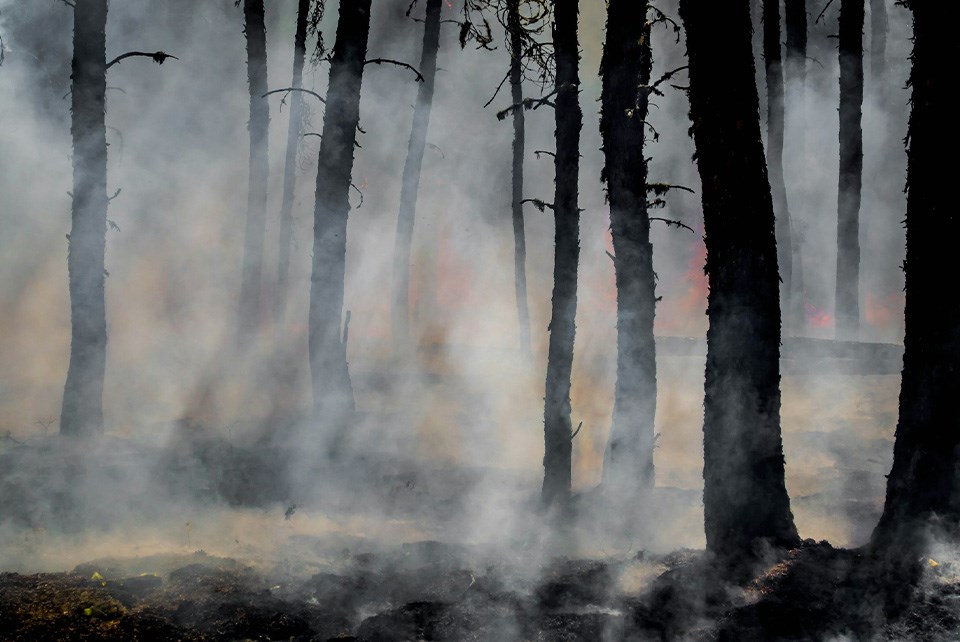NORTHERN SASKATCHEWAN — Wildfires in the Northern Region III had the Métis Nation-Saskatchewan declaring a state of emergency, jointly issued by NRIII Regional Council’s Fred Kenny of Canoe River (Local 174) and Sipisik’s Rocky Hansen (Local 37) on Tuesday, July 22.
The area being ravaged by the northern wildfires sits in Treaty 8 Territory, the heartland of the Métis in Île-à-la-Cross, displacing hundreds of residents and consuming hectares of traditional lands, which is why, with the threat to affect the Métis footprint, MNS officials are urging the provincial government to act on the seriousness of the situation.
MNS, in a statement, said the government should recognize the gravity of the situation and work with them to protect their citizens, constitutionally protected Métis rights, and traditional territories in the communities of Green Lake, Pinehouse, Île-à-la-Crosse, Beauval, Jans Bay, Cole Bay, Dore/Sled Lake, Patuanak, Canoe River, and Sapawagamik. The Muskeg and Buhl fires have affected a combined over 259,000 hectares, with the latter at Weyakwin at 38,000 hectares, and have received attention from both the Saskatchewan Public Safety Agency and the Government of Canada.
MN-S Minister of Self-Determination and Self-Government Brennan Merasty stated that the citizens of Beauval and the other communities mentioned are facing uncertainty as they are threatened with losing their properties due to the wildfires continuing to rage.
“Our citizens are gripped with uncertainty, uncertain of what they will return to, and whether their homes and way of life will still exist. As Métis people, we are shared stewards of these lands, and our connection is not only cultural and historical — it is constitutional. Our Métis footprint in the northwest, particularly in Northern Region III, is at risk of significant impact. We are witnessing the destruction of traplines, harvesting areas, traditional medicines, and critical habitats - the very foundations of our way of life,” said Merasty.
He added that these losses are not only an environmental crisis and source of damage, but also a threat to their Section 35 rights under the Constitution; thus, it is a constitutional and cultural emergency, as MNS, especially NRIII, are invested in protecting the lands within the 1994 title claim over Northwest Saskatchewan.
MNS, in its statement, said its title claim seeks several declarations regarding Aboriginal rights to title, rights to hunt, trap, fish, and commercial harvesting rights, and the government must act now before more damage affects the said communities.
“NRII is calling on the Government of Saskatchewan to engage with [MNS] immediately and provide the necessary resources and support to protect our lands, uphold our rights, and preserve our future,” said MNS.
Saskatchewan NDP MLAs Jordan McPhail (Shadow Minister for Northern Affairs) and Leroy Laliberte (Shadow Minister for First Nations and Métis Relations), in a joint statement, said the northern wildfires had a widespread impact on the traditional trapping, hunting, and fishing of those living in the affected communities.
“To date, folks relying on natural lands for food and their livelihoods have heard nothing in the way of support or direction from the Saskatchewan Party Government. Many fear they will be tasked with massive cleanup efforts needed on these lands that they cannot afford to undertake themselves. We must acknowledge that the fires, many of which continue to burn across the North, have had a profound impact on those living in the Region,” McPhail and Laliberte said in the statement.
“Entire communities have been lost, so many have been displaced and will continue to be for months and years to come. We need the [government] to come forward with a broad strategy for rebuilding the North, the homes and businesses lost, the financial strain it’s caused for families and the incredible impact to cherished lands that were to be relied on for generations to come.”


.png;w=120;h=80;mode=crop)

